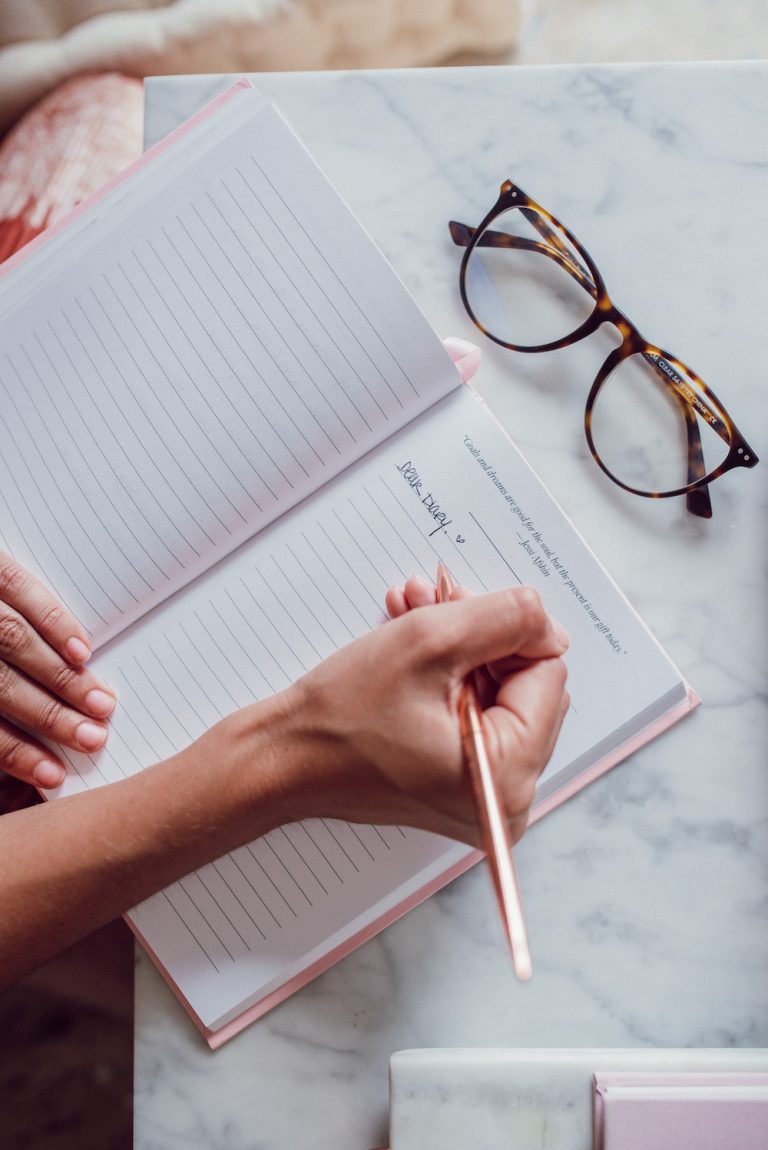
Before we get to all the journaling fun…I just want to point out that this post is part of a larger series here on the blog all about Elul, the final month of the Jewish calendar year and the beautiful period of introspection leading up to the High Holidays. You can check out all of the posts over here, and learn more about the month ahead by watching my new Jewish at Home series with Rabbi Elizabeth Bonney-Cohen.
Okay—onto the point of today’s post! I’m really excited about this. Below, I’m sharing journaling prompts for each of the 29 days that make up this incredibly important, sacred time of year. Much like the secular New Year, Rosh Hashanah offers us a chance at a fresh start or reset. But it’s pretty much impossible to reap the benefits of a day like that without at least a little bit of forethought. If you were interested in making New Year’s resolutions, for instance, you likely wouldn’t whip out a pad of paper at 11:59 P.M. on December 31st. You’d give yourself some lead time—at least an hour, if not a full day or week.
That’s exactly how many Jews view the month of Elul. It’s a time to process the events of the year that’s coming to a close, tie up loose ends, and draw closer to G-d. Since seeking forgiveness is also a key part of the High Holidays, that’s a big part of this time, too.
I’m hoping that each of the prompts below will help you make the most of this exquisite, somewhat solemn, forward-and-backward-looking, preparatory time. I wrote each of these because they’re things I’m genuinely interested in exploring myself, so just know I’ll be writing about them along with you! Give me a shout on Instagram if you’re participating (I *love* hearing from you all) and look out for my daily Stories about this, too.
Sending love and good thoughts to all of you. ♥️ שנה טובה
1 Elul
“…It is as if [the shofar’s call] is saying: Wake up, sleepy ones, from your sleep…and you who slumber, arise.” (Maimonides, Mishneh Torah, Repentance 3:4)
Many congregations and individuals blow the shofar to conclude each morning of prayer during Elul. Write down a single word that will serve as your personal “shofar” during the coming year—one that you can use to rouse yourself to action. Reflect on why you chose this word to accompany you through 5781.
2 Elul
“You can get excited about the future. The past won’t mind.” ―Hilary DePiano
Pick one thing you don’t like about yourself—maybe it’s something physical, maybe it’s something you did or something about your past, maybe it’s a habit you’re trying to break. From the point of view of that “thing,” whatever it is, write a letter to yourself (you can try opening with the words, “Dear [your name]…”).What does this thing want you to know? Why is it a part of you or a part of your life? What is its role?
3 Elul
“Try not to become a man of success. Rather, become a man of value.” ―Albert Einstein
Have you ever written them down your personal values in a formal capacity? Try doing that today. Which are truly yours, and which belong to someone else? Which matter most to you? Which have changed over time? Which are you questioning? Which would you never give up—and why?
4 Elul
“I am my beloved’s and my beloved is mine.” (Song of Songs 6:3)
Elul is believed to be an acronym for the first letters of commonly cited Hebrew verse, “ani l’dodi v’dodi li” (“I am my beloved’s and my beloved is mine”). Many believe that G-d is the “beloved” referenced in that phrase, so they see Elul as a time to draw closer to G-d and become more intimately acquainted with their faith. In whatever capacity you’re comfortable, write a short “love letter” or note of gratitude/friendship to G-d, or to Judaism as a whole, or to whatever you’re hoping to recommit to in the coming year.
5 Elul
“There’s a trick to the ‘graceful exit.’ It begins with the vision to recognize when a job, a life stage, or a relationship is over—and let it go. It means leaving what’s over without denying its validity or its past importance to our lives. It involves a sense of future, a belief that every exit line is an entry, that we are moving up, rather than out.” ―Ellen Goodman
Are there specific scenarios in your life for which you currently seek closure? Is closure really attainable? If so, might it be possible to mentally close the loop or the door on those areas of your life without involving other people? For which scenarios is that not possible; i.e., for which scenarios do you feel compelled to involve, converse with, seek forgiveness from, or bestow forgiveness upon others?
6 Elul
“We dream to give ourselves hope. To stop dreaming—well, that’s like saying you can never change your fate.” ―Amy Tan
Write a one-paragraph, third-person biography of your life, fifteen years in the future—the kind that might appear on the inner flap of a book jacket. Who or what feels most important to include? What are you most proud of hypothetically having achieved? Where do you live? What are you known for (by friends or the larger world)?
7 Elul
“Most of us spend too much time on what is urgent and not enough time on what is important.” ―Stephen R. Covey
Draw a pie chart of your life. It’s an easy way to visualize where your priorities have landed in the past year. Some sample “pie piece” categories might be: “relationships,” “work,” “hobbies,” “alone time,” “entertainment,” and so on. How much time do you spend with others? With yourself? On things that truly matter to you? Now draw a pie chart visualizing a more ideal use of time—thinking ahead to how you hope to spend your energy in 5781.
8 Elul
“All the month of Elul, before eating and sleeping, a person should look into his soul and search his deeds, that he may make confession.” —Maharal of Prague
Confess or admit something to yourself today. It can be as small or as big as you’d like. “I am…” “I don’t…” “I believe…” “I can’t…” “I can…” “I want…”
9 Elul
“Jews don’t stand still except when standing before God. The universe, from galaxies to subatomic particles, is in constant motion, and so is the Jewish soul… It is our destiny to travel. We are the restless people.” —Rabbi Jonathan Sacks
Make a plan for your dream trip or vacation—the one you might actually be able to take next year, or one that might exist only in dreams for the foreseeable future. Where would you go? What would you do? Who would you want to go with? How long would you stay? How would you feel, waking up in that new place? Rested and refreshed from the time away from “real life,” what kind of person would you hope to be when you eventually came back?
10 Elul
“Who sings in this world will sing also in the next.” —Talmud, Sanhedrin
Close your journal today. Make a playlist of at least 10 songs that will serve to inspire you to be better, braver, and more in touch with the divine in the coming year. Maybe the lyrics of these songs speak to you, or maybe the melodies feel relevant to the feelings you’re hoping to manifest in 5781. Maybe they just make you happy. There doesn’t really need to be a rhyme or reason.
11 Elul
“Close your eyes and imagine the best version of you possible. That’s who you really are, let go of any part of you that doesn’t believe it.” —C. Assaad
Use the quote above to inspire your journaling today. What is “the best version” of you? What does a day in her or his life look like—down to the smallest detail? What time does she/he wake up? Does she/he drink coffee? What does she/he wear? What does she/he stand for? What does she/he want? Who, and what, does she/he love?
12 Elul
“Our goal should be to live life in radical amazement… Get up in the morning and look at the world in a way that takes nothing for granted. Everything is phenomenal; everything is incredible; never treat life casually. To be spiritual is to be amazed.” —Rabbi Abraham Joshua Heschel
What do your mornings look like right now? Do you have a true “routine”? In what ways do your mornings help or hinder you from living a more peaceful, contented life—and more importantly, how are they helping or hindering you from improving the lives of those around you? How might you kickstart, change, maintain, or update your mornings in 5781?
13 Elul
“And above all, remember that the meaning of life is to build a life as if it were a work of art.” —Rabbi Abraham Joshua Heschel
Let this quote from Rabbi Abraham Joshua Heschel guide your journaling today. How will you build a life like “a work of art” in 5781? What does that phrase mean to you? Does it inspire you to think about taking up any new creative hobbies? Or are there are other, less literal ways to think about adding a sense of “artistry” and care to one’s life?
14 Elul
“When a person doesn’t have gratitude, something is missing in his or her humanity. A person can almost be defined by his or her attitude toward gratitude.” —Elie Wiesel
Today, instead of journaling, send a note of thanks to five friends or family members. Maybe that means writing each of them a quick text; maybe it means drafting longer, handwritten letters. It’s your choice.
15 Elul
“Rabbi Yohanan ben Zakkai used to say: if you have a sapling in your hand, and someone should say to you that the Messiah has come, stay and complete the planting, and then go to greet the Messiah.” —Avot de Rabbi Nathan, 31b.
What experiences do you hope to have with nature in the coming year? Will you try to get outside more? Start a garden? Go on hikes or walks? How will you change your relationship with the natural world, and what impact might it have on the rest of your life?

16 Elul
“To believe in something, and not to live it, is dishonest.” ― Mahatma Gandhi
What’s something you believe in, but don’t “live”? Conversely: What’s something you say often, but don’t really believe?
17 Elul
“The best things to do with the best things in life is to give them away.” —Dorothy Day
What’s one thing you want to keep in 5781 (in a material or figurative sense)? What’s one thing you’d like to give away?
18 Elul
“I love quotations because it is a joy to find thoughts one might have, beautifully expressed with much authority by someone recognized wiser than oneself.” —actress and singer Marlene Dietrich, the first woman and German to receive the Israeli Medallion of Valor in 1965 for her “courageous adherence to principle and consistent record of friendship for the Jewish people.”
Select and jot down a quote to live by in the coming year. Just one.
19 Elul
“What sort of diary should I like mine to be? …I should like to come back, after a year or two, and find that the collection had sorted itself and refined itself and coalesced… The main requisite, I think, on reading my old volumes, is not to play the part of a censor, but to write as the mood comes or of anything whatever; since I was curious to find how I went for things put in haphazard, and found the significance to lie where I never saw it at the time.” —Virginia Woolf
Write a letter to yourself at the end of 5781. Seal it in an envelope and set a reminder to read it in a year.
20 Elul
“I have loved the stars too fondly to be fearful of the night.” ―Sarah Williams
What does your evening or before-bed routine look like now? In what ways is it helping or hindering you from living a more peaceful, contented life? How might you change, maintain, or improve this routine in 5781? Make an actionable plan to help you get started.
21 Elul
“Cultivate the habit of being grateful for every good thing that comes to you, and to give thanks continuously. And because all things have contributed to your advancement, you should include all things in your gratitude.” —Ralph Waldo Emerson
What are five things from the past year for which you feel grateful—things you’ve seen, had, done, said, loved, witnessed, tried, understood better, accepted, lost, found, or experienced?
22 Elul
“Piglet noticed that even though he had a Very Small Heart, it could hold a rather large amount of Gratitude.” ―A.A. Milne, ‘Winnie the Pooh‘
What are five things, people, places, experiences, or beliefs for which you feel particularly grateful as you look toward the new year?
23 Elul
“Our lives no longer belong to us alone; they belong to all those who need us desperately.” —Elie Wiesel
Who “needs you”? Maybe it’s a child, maybe it’s a community of people, maybe it’s someone you’ve never met before. How will you lend your life to theirs in 5781?
24 Elul
“This year, I want to call myself to task for what I have done and not done for peace. How much have I dared in opposition? How much have I put on the line for freedom? For mine and others?” —Marge Piercy
Use Marge Piercy’s beautiful words above to guide your journaling efforts today. How much have you “dared in opposition”? How much have you “put on the line for freedom”? What have you “done and not done for peace”?
25 Elul
“Rosh Hashanah is the Creation of the World. It is a time to recreate ourselves by recognizing our faults, repenting and asking forgiveness from others for our sins, all leading to atonement, granted by God for our actions.” —Marc Rubenstein
Who have you not yet forgiven? Will forgiveness be possible this year? Could it start today? Plant the seeds of these thoughts today; we’ll return to them on the 27th of Elul.
26 Elul
“A choir is made up of many voices, including yours and mine. If one by one all go silent, then all that will be left are the soloists. Don’t let a loud few determine the nature of the sound. It makes for poor harmony and diminishes the song.” ―Vera Nazarian
This one’s sort of an extension of the prompt from 16 Elul. What’s one thing you were proud to have spoken up about in 5780—whether in a personal relationship, a friendship, at your workplace, or in the world at large? Conversely, what’s one thing you stayed quiet about in 5780? What would you like to speak up about more in 5781?
27 Elul
“Letters on paper, in an envelope, have a solidity to them that seems to suppress time. Or recover it.” —Michael Enright
Write a letter to (or call, or text, or email) any friends or family members from whom you wish to seek forgiveness.
28 Elul
“Rosh Hashanah isn’t just about being new, it’s about a change.” —Max Levis
On the morning of Rosh Hashanah, what is the one feeling you wish to embody? How might you get to the place of feeling that way? (This could be as literal as going to sleep at a certain time the night before or meditating on the morning-of, or it could be as radical as changing an entire aspect of your life.)
29 Elul
“Rosh Hashanah is about relationships. Whether between individuals and the God in whom they believe, communities and the traditions which define them, or simply between individuals, whether any God or tradition is part of their lives, it’s all about sustaining relationships which sustain us and help us do the same for others.” —Rabbi Brad Hirschfield
In 5781, how do you want others to feel when they’re with you or interacting with you? How can you help them reach that feeling?

One Comment